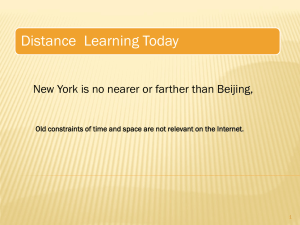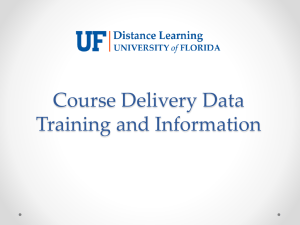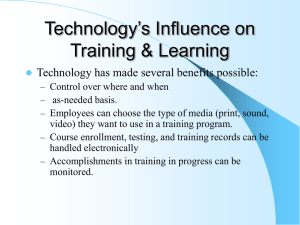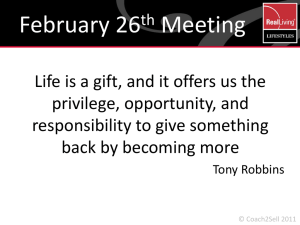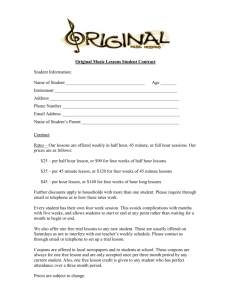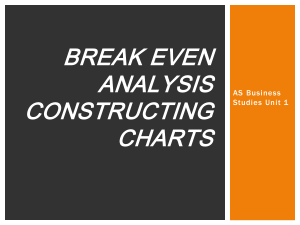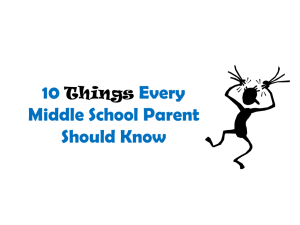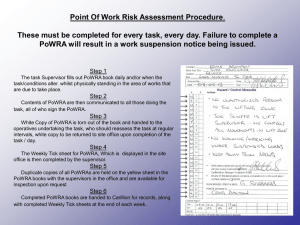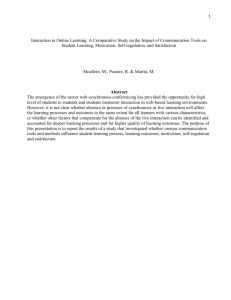Syllabus - Florida State University
advertisement
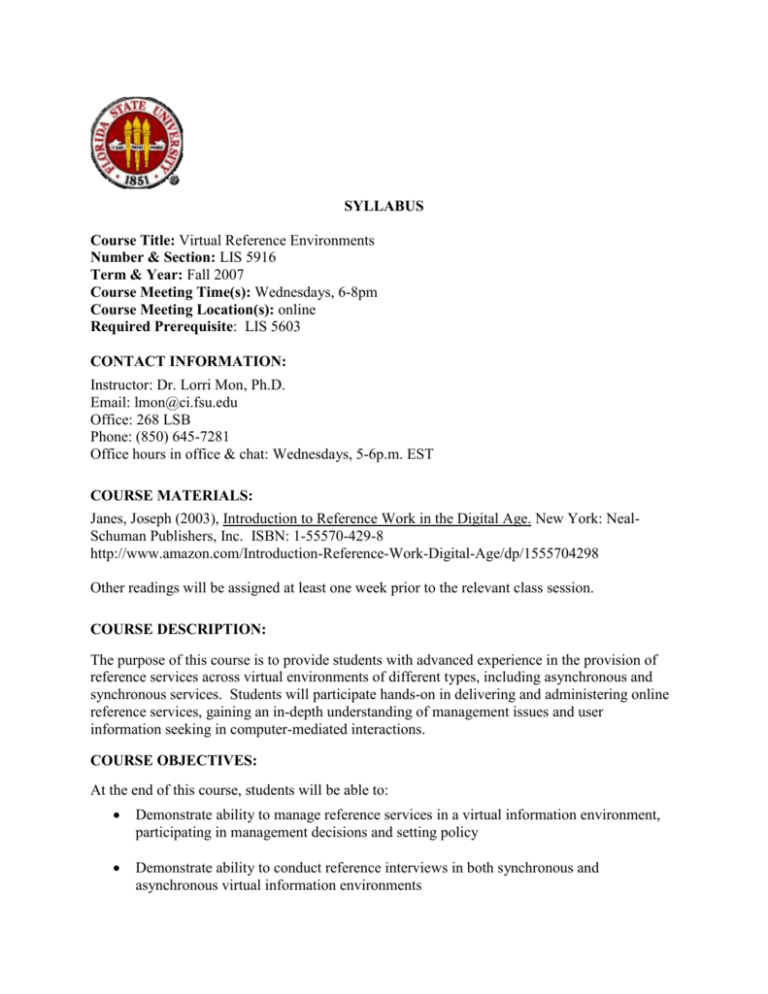
SYLLABUS Course Title: Virtual Reference Environments Number & Section: LIS 5916 Term & Year: Fall 2007 Course Meeting Time(s): Wednesdays, 6-8pm Course Meeting Location(s): online Required Prerequisite: LIS 5603 CONTACT INFORMATION: Instructor: Dr. Lorri Mon, Ph.D. Email: lmon@ci.fsu.edu Office: 268 LSB Phone: (850) 645-7281 Office hours in office & chat: Wednesdays, 5-6p.m. EST COURSE MATERIALS: Janes, Joseph (2003), Introduction to Reference Work in the Digital Age. New York: NealSchuman Publishers, Inc. ISBN: 1-55570-429-8 http://www.amazon.com/Introduction-Reference-Work-Digital-Age/dp/1555704298 Other readings will be assigned at least one week prior to the relevant class session. COURSE DESCRIPTION: The purpose of this course is to provide students with advanced experience in the provision of reference services across virtual environments of different types, including asynchronous and synchronous services. Students will participate hands-on in delivering and administering online reference services, gaining an in-depth understanding of management issues and user information seeking in computer-mediated interactions. COURSE OBJECTIVES: At the end of this course, students will be able to: Demonstrate ability to manage reference services in a virtual information environment, participating in management decisions and setting policy Demonstrate ability to conduct reference interviews in both synchronous and asynchronous virtual information environments Demonstrate ability to handle complex reference questions Demonstrate knowledge of relevant theories and research on information seeking interactions in virtual online environments COURSE POLICIES: Students will meet weekly online to discuss the weeks’ workload, review assignments, report progress, and brainstorm about management issues and solutions. While this course relies upon individual initiative and self-direction, participation in the weekly synchronous discussion is required and assignments are due on the date specified. More than two unexcused absences will result in the loss of one participation point. Being late twice without permission equals one unexcused absence. Please contact me (e-mail) in advance if you need to miss or be late to a class session. Participation in the asynchronous discussion boards counts toward your participation grade. A minimum of one substantive weekly posting is expected. Responses are encouraged and will contribute to your learning process. GRADING/EVALUATION: How your work will be evaluated: Each assignment will contribute towards your final grade as follows. Total possible is 100% Weekly asynchronous postings Weekly synchronous participation Weekly Journal/Blog Assignment Short Wiki Paper Assignment Final Project & Presentation 10% 10% 20% 20% 40% All grades will be given either on a 4 point letter scale or on a 100 point scale. The equivalent letter grades are presented here: A 93 - 100 A89 – 92 B+ 85 – 88 B 81 – 84 B77 – 80 C+ 73 – 76 C 69 – 72 C65 – 68 D+ 61 – 64 D 57 – 60 D53 – 56 F 0 – 52 ASSIGNMENTS/RESPONSIBILITIES: Participation: Students will meet weekly via chat, Second Life, or Elluminate to discuss the weeks’ workload in running the Internet Public Library virtual reference environment, reviewing assignments, reporting progress, and engaging in shared problem-solving. Journal/Blog: Students will maintain an online journal, wiki or blog with a weekly report of class-related activities (administrative issues handled, reference questions answered, reflections on other accomplishments, and relevant issues) Short Wiki Paper: Students will complete an “exploring the information environment” short paper (2-3 pgs) on another service out there which is similar to or relevant to the Internet Public Library and FSU’s Second Life. Example topics: Info Island in Second Life; Yahoo! Answers; InfoEyes VoIP for blind online users; Florida’s statewide “Ask a Librarian”; Wikipedia, etc. The paper will describe: what this service does; the clientele; the service providers; how this service is financially supported; and other relevant policies and issues. Students will contribute their work to a Virtual Reference Environments online wiki. Individual/Group Project: Students will work either individually or in a small group to complete a major project in some aspect of online reference information environments, such as writing a policy document or training document, building an online training module, participating in an assessment or research project, writing a grant proposal, or designing a teaching presentation for the Internet Public Library or FSU’s Second Life. Students are encouraged to think broadly about what they would like to do, and to propose possible topics to the instructor for approval. Attendance: Participation in the weekly synchronous meetings and asynchronous discussions is required. Students must post at least once to each week’s asynchronous discussion board, and attend the weekly synchronous session to receive full participation points. More than two unexcused absences will result in the loss of one participation point; being late twice without permission equals one unexcused absence. A minimum of one substantive weekly discussion board posting is expected. COURSE CONTENT AND OUTLINE: Week 1: Course introduction and logistics Week 2: Internet Public Library Introduction to the Internet Public Library and history of the IPL since 1995; the IPL in teaching and research. Week 3: History of Digital Reference, Part 1 Early asynchronous digital reference efforts; the e-mail interview and emergence of form-based interviewing. Reading: Janes, Chapter 2, pages 47-69 [section on asynchronous interviews]. Week 4: History of Digital Reference, Part 2 Early asynchronous digital reference efforts, the chat interview and emergence of chat reference consortia. Reading: Janes, Chapter 2, pages 47-69 [section on synchronous interviews] Week 5: Communication Issues in interpersonal online communication for virtual reference interactions including emoticons, smilies, use of language, and culture. Reading: Janes, Chapter 11 [responding to information needs] Week 6 Online Users: Part 1: Evaluation and Trust Issues in evaluating user satisfaction with digital reference services, what is “quality,” cognitive authority, and what constitutes a “good enough” answer from the user and librarian perspectives. Week 7: Online Users, Part 2: Online Education Teaching in the digital reference interaction and provision of online training; issues of learning within the constraints and affordances of the online virtual environment. Week 8: Online Users, Part 3: Working Groups and Online Collaboration Online working groups and collaborations in the virtual environment, including issues of virtual reference collaborative services. Reading: Janes, Chapter 4, pages 124-138 (Collaborative services and technologies) Week 9: Online Users, Part 4: Online Identity Issues of anonymity, privacy, gender, language, and roles in virtual interactions. Reading: Janes, Chapter 1, pages 17-19. Week 10: 3-D and Immersive Virtual Environments History of the development of visual online interactive environments Week 11: Second Life Second Life Library and educational efforts in Second Life. Week 12: Web 2.0 and Interactive Technologies Incorporating new interactive features into the virtual reference experience. Week 13: Project Presentations Class presentations of students’ work on final projects, including provision of feedback Week 14: Project Presentations Class presentations of students’ work on final projects, including provision of feedback Week 15: Final Presentations and Wrap-Up; The Future Completing last student presentations; future directions in virtual information services ACADEMIC HONOR POLICY: The Florida State University Academic Honor Policy outlines the University's expectations for the integrity of students' academic work, the procedures for resolving alleged violations of those expectations, and the rights and responsibilities of students and faculty members throughout the process. Students are responsible for reading the Academic Honor Policy and for living up to their pledge to ". . . be honest and truthful and . . . [to] strive for personal and institutional integrity at Florida State University." (Florida State University Academic Honor Policy, found at http://www.fsu.edu/~dof/honorpolicy.htm.) AMERICANS WITH DISABILITIES ACT: Students with disabilities needing academic accommodation should: register with and provide documentation to the Student Disability Resource Center; and bring a letter to the instructor indicating the need for accommodation and what type. This should be done during the first week of class. This syllabus and other class materials are available in alternative format upon request. For more information about services available to FSU students with disabilities, contact the Student Disability Resource Center 97 Woodward Avenue, South Florida State University Tallahassee, FL 32306-4167 US +1 8506449566 Call (voice) US +1 8506448504 Call (TDD) sdrc@admin.fsu.edu http://www.fsu.edu/~staffair/dean/StudentDisability/ ATTENDANCE POLICY: The instructor will accommodate absences due to documented illness, deaths in the immediate family and other documented crises, call to active military duty or jury duty, religious holy days, and official University activities and will do so in a way that does not penalize students who have a valid excuse. Consideration will also be given to students whose dependent children experience serious illness. All students are expected to abide by this class attendance policy. Students must also provide, when possible, advance notice of absences as well as relevant documentation regarding absences to the instructor as soon as possible following the illness or event that led to an absence. Regardless of whether an absence is excused or unexcused, the student is responsible for making up all work that is missed. SYLLABUS CHANGE POLICY: This syllabus is a guide for the course and is subject to change with advanced notice.
